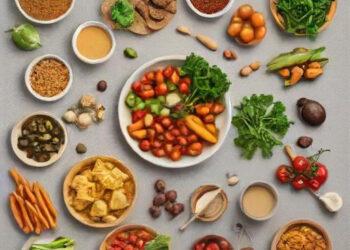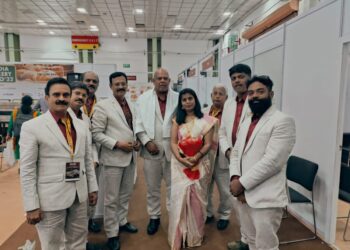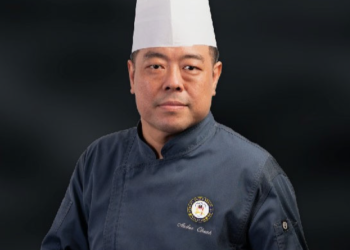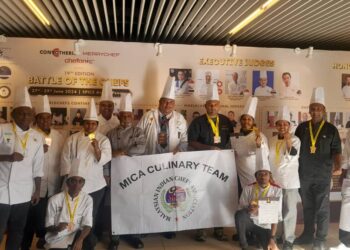By Ayshwaria Lakshmi (cbedit@imaws.org)
Veganism is slowly becoming the buzzword in the culinary circles of India. And agar-agar (or simply agar) – a seaweed/red algae – is now the preferred vegan alternative to cow-hoof-based gelatin.
Marine Hydrocolloids, from the house of Meron Group, is an exporter and market leader of premium quality agar from India. It is the exclusive supplier of the gelatinous food ingredient to many MNCs and 90 percent of commercial tissue culture laboratories in India, besides some leading labs in the rest of the world. The company exports to the United States, South America, Europe, CIS & Russia, Africa, Middle-East, South East Asia, Far-East, and Australia.
Kurian Jose, the Chief Executive Officer of the company, speaks about the vegan market in India and about their agar products. Edited excerpts:
 How has the vegan-based food products market opened up in India?
How has the vegan-based food products market opened up in India?
India is the second largest country in the world which eats more vegetarian food than non-vegetarian. Vegan is a term used to define any product which excludes animal products, animal derived by-products or products which includes animal exploitation/cruelty. In gastronomic parlance, vegan means inclusion of all plant-based food and exclusion of animal-based food and any food that has animal origin (which includes honey as well as dairy-based products).
In recent times, there has been a significant rise in people following veganism, largely influenced by European practices as well as increased awareness. More people have started converting themselves from non-vegetarians to vegans. Some people follow veganism for religious purposes, too.
Could a vegan-only bakery product thrive in India, and how?
Vegan food products brought in more than $2 billion in the U.S. this year. And that is just one aspect of the constantly growing market for vegan products. As more and more people become aware of the impact of animal-based products on their health and the environment, many are choosing to go vegan or at least reduce their consumption of animal products. This opens up a major opportunity for vegan entrepreneurs.
Baked goods are also not usually vegan-friendly due to common ingredients, like eggs and butter. But you can make tons of tasty treats using alternatives that do not include any animal products.
A vegan-only bakery therefore has the potential to cater to not just vegans, but also vegetarians, who do not have to fear the usage of eggs or other such ingredients in the products. This being considered a more premium service can also demand a premium value, thus making business sense.
How big is the global vegan market?
The vegan food market size was valued at $14.2 billion in 2018 and is expected to reach $31.4 billion by 2026, registering a CAGR of 10.5 percent from 2019 to 2026. The global vegan food market is segmented based on product type and distribution channel.
Veganism has been one of the mainstream trends in the food & beverages industry. An increase in the incidence of health disorders, rise in a number of health-conscious consumers, and increase in disposable income of target customers have been some of the key factors driving the trend of veganism in key regions, specifically North America and Europe.
The trend has been carried forward by the ex-pats from this region to their homelands in Asia and Far-East. This has increased the demand for different types of plant-based food products, such as dairy alternatives and meat substitutes, since most of these products are derived and processed with plant-based sources, such as soy, almond and meat substitutes.
What range of products do you produce? How do you innovate with the products?
We have a wide range of products in the hydrocolloids segment, which are all processed from seaweeds and other plant-based sources. Our core product is agar agar, which is further customized to cater to industries ranging from pharmaceuticals to food, research, medical and cosmetics. We have further innovated the product to give a smoother application and mouthfeel, in our spreadable agar called Wondergel. Furthermore, in our kitty, are Carrageenan – a stabilizing agent, Gellan Gum – a plant gel used as a suspension agent and Sealife – a health supplement and dietary fiber made from sea weeds.
Agar agar is a vegetarian ingredient and healthier substitute for gelatin processed from seaweeds and is vegan, gluten-free, non-GMO, has zero calorie, no carbs, no sugar and is full of fiber. It is free from starch, soy, corn, yeast, wheat, milk, egg and preservatives. It absorbs glucose in the stomach, passes through the digestive system quickly and inhibits the body from retaining and storing excess fat.
Wondergel is a unique functional ingredient obtained by transforming the rigid structure of native agar with no chemical treatment to give a softer and creamy texture, which still maintains the natural benefits of seaweed fiber.
Carrageenan is a wholly natural hydrocolloid that belongs to a family of water-soluble polysaccharides extracted from certain species of red seaweed. Because of its gelling, thickening, and stabilizing properties, it is widely used in the food industry. Carrageenan’s primary application is in dairy and meat products. Due to the strong binding to the food proteins, it is a vegetarian alternative to gelatin. It is vegan, gluten-free, non-GMO, almost zero calories and with high fiber content.
Gellan Gum is an excellent water gelling agent used to improve heat stability as well as to decrease the setting time. It is also can be used as suspending agent. Gellan Gum is widely used in food, such as jelly, suspension beverage, baked products, frostings, jams, bread stuffing, sugar coatings, synthetic food, etc.
Sealife is Marine Hydrocolloids’ two-in-one texturizer and dietary fibre, made from 100 per cent pure pulverized gracilaria seaweed. It is not just a simple seaweed fibre, but is considered a novel food ingredient giving soluble and insoluble dietary fibre. Sealife is organic, chlorine-free, gluten-free, and GMO-free. Its soluble fibre component can be dissolved in warm water to form gel upon cooling. Sealife is an alternative source of iodine and potassium, too.
How harmful is gelatin? Do hoteliers and home bakers know about it?
Gelatin, though popularly used, invokes a rather blithe ignorance among its consumers. The larger population is not only unaware of the harm it can do to their body, but also does not know where it is sourced from.
Here is a table demonstrating why agar is better than gelatin:
|
|
Agar Agar |
Gelatin |
|
Economical aspect |
Lower dosage |
Higher dosage |
|
Shelf life |
Longer (Higher Melting point guarantees low whey-out phenomena). |
Shorter (Lower Melting point increases the risks of phase separation) |
|
Culture and religion |
Vegan, Non-GMO, Gluten free, Odourless, Colourless. 100% vegetable origin. No Religious issue. |
Non-Vegan, Animal origin. Severe restriction in religious believes. |
|
Functionality |
It does not require refrigeration for setting gel. It is thermo reversible |
It requires refrigeration It is thermo – irreversible |
Tell us about your innovations in packaging?
All our products come in packaging styles that ensure that the core product retains its essence and features till it reaches the point of consumption. Furthermore, we have introduced larger pack sizes in tin containers that make it easier to store and re-use. Our pack designs provide a ready reckoner to the time-strapped shopper on the specific usage of each sub-brand.
What are your current and future expansion plans?
Our current expansion is into the foray of retail for both domestic as well as research/scholastic consumption. We are looking at setting up a global footprint of our products into the homes of the end consumers of food, cosmetic and DIY applications.
Advertisement: Neural Networks wishes Meron Group on their global plans. We are Kerala’s leading solution providers for Cloud based IT infrastructure solutions, Servers & Storages, Networking Solutions, Security Solutions, and Backup solutions. Visit http://neuralebiz.com/







